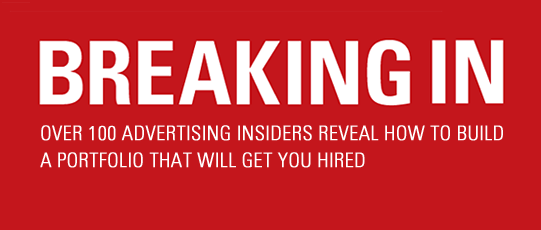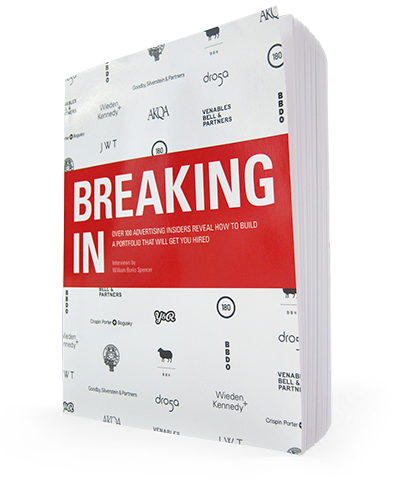Check out some great work from Kevin Roddy.
WS: What do you look for in a student book? And what impresses you?
KR: I might be different than some in that regard because I look, first and foremost, at the thinking behind any creative solution. Even more than the idea or execution itself, I look at how they are solving the problem…what’s the thinking behind that. Because what I find is that there are a lot of people who approach a problem in a straightforward way and, I think, when you do that you’re on quite a crowded highway. A different way at the problem leads more easily to a different idea. A unique idea. It must be relevant to the problem but it will stand out to me more when its approach isn’t something I’ve seen before or easily expect.
Beyond that I look at what I imagine are the clichés of portfolio reviews: quality of the idea and execution of the idea.
But more so today than ever before, I’m never more disappointed than when I see a book that’s filled exclusively with print ads, television spots, and maybe the occasional microsite thrown in. You’d be surprised at how many of those I still come across. Again, I think more than anything, and this goes back to the first point, I look for big ideas—big ideas that can and are executed in a lot of different ways. I’m never interested in ideas that are executed in a limited fashion. I don’t want to see the limits of an idea, I want to see how unlimited it can be. I want to see it live in more than a couple ads. I want to know that the person behind the book knows the value of a big idea to a brand.
For that reason, among others, I don’t like to see one-off ads in a book. To me that says the person had an “ad,” not an “idea.” And as I’ve said, I’m less interested in ads than I am in ideas. Big ideas. Enduring and engaging ideas. And a portfolio is the place to prove to me that a person thinks that way.
[ … ]
WS: Do you have any general advice for someone who is putting a book together or trying to get in the industry?
KR: Yeah. My advice would be this: Never think your book is good enough. Ever. I don’t care if you’ve gone to two years of school and paid a lot of money and you now have a book that you think is pretty good and it’s time to shop it around. My point of view is, as soon as you leave school, either make the work in there better or do more of it. Always refresh your book. Always look to make it better.
I believe that if you get a great job and that job is allowing you to do fantastic work, then you’re golden. Your book will improve via that. However, most first jobs won’t allow that. So I say, work on your book at night. If the job isn’t allowing you to do the work you think you are capable of, then do it on the side because I want to see what you’re capable of, not necessarily what you’re doing. If you allow the agency you work at to define your work, you could potentially be screwed.
When I got my first job, I knew I wouldn’t ever be able to show what I was capable of doing. I was writing headlines for a Bed, Bath, & Beyond retail newspaper ads. The visual was dozens of tiny product pictures with prices. I told myself, “This isn’t all I can do—if I don’t show that I can do more than this, I’ll never get out of here.” So I kept working at night. And when some work I’d done got me my next job, it still wasn’t going to be enough. So I kept working at night. I kept doing work on the side, selling it to clients and getting it in shows until, eventually, I got to a place where I actually was doing the kind of work I thought I was capable of doing.
But if you ever believe this business is easy, if you ever believe you’re great, if you ever believe your book is good enough, you’re dead—absolutely dead. There are too many people who are better than you. I don’t care who you are, there is always somebody better. And so you can’t stop. Never ever stop working on your book. Even when you get a job. Keep working on it. Keep making it better.


Comments are closed.